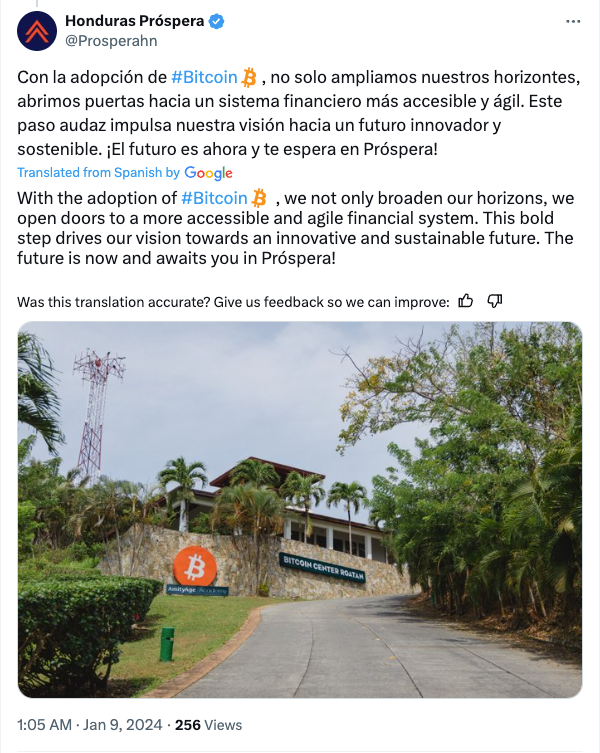Honduras has exited the World Bank’s arbitration body amidst a dispute with Próspera Inc., seeking $10.8b in compensation.
Another new development in the ongoing conflict between Honduras and the dissatisfied crypto island-building corporation Próspera Inc. is that eighty-five economists have expressed their support for the Honduran government’s decision to withdraw from the World Bank’s arbitration panel.
Following a change in legislation in 2022 that eliminated the island’s capacity to be considered a special economic zone, Próspera, a Bitcoin-focused special economic zone on the Honduran island of Roatán named for the United States corporation responsible for its construction, has been requesting $10.8 billion in compensation from the government.
The conflict has been going on at the International Centre for Settlement of Investment Disputes (ICSID), which is a dispute resolution organization.
“For decades, international arbitration courts like ICSID have allowed corporations to sue states and restrict their freedom to regulate in favor of consumers, workers and the environment.”
Experts Laud Honduras Withdrawal
On the other hand, the economists stated in an open letter, which was published on March 19, that the withdrawal of Honduras from the international court in February constituted a “critical defense of Honduran democracy.”
After the government repealed regulations in April 2022 that affected the legal certainty of the crypto island’s special economic zone designation and its investments.
Próspera eventually took its lawsuit before the International Centre for Settlement of Investment Disputes (ICSID) in late 2022, saying that Honduras owed it billions of dollars for breaking a “50-year legal stability guarantee it made.”
Following the publication of their open letter, the economists stated that there was a lack of evidence to demonstrate that governments profit from the arbitration body.
The left-wing organization Progressive International, which produced the economists’ letter, claimed that “we find scant economic evidence that mechanisms like ICSID stimulate meaningful foreign direct investment.”
There have been ten claims brought before the International Center for Settlement of Investment Disputes (ICSID) against Honduras since the election of President Xiomara Castro in 2021.
Próspera, a company based in the United States, brought the greatest of these cases, claiming about eleven billion dollars, equivalent to approximately one-third of the country’s gross domestic product.
To be more specific, Castro overturned regulations that established ZEDEs, which stands for Zones of Employment and Economic Development.
The design of these zones aimed to attract foreign investors to Honduras, thereby boosting the country’s economy. ZEDE’s legislative frameworks were the subject of human rights concerns stated by the United Nations in June 2021, and the organization voiced its desire for an alternate approach.
It was brought to light that around 35 percent of Honduras, comprised primarily of regions with indigenous and Afro-descendant populations that did not have “informed consultation” on the scheme, was designated for the utilization of ZEDE.
Próspera established a ZEDE on the island of Roatán, located around 40 miles (65 kilometers) off the shore of the north coast of Honduras. The laws at the time practically granted Próspera sovereignty over the island, including the authority to create its own rules, courts, police authorities and taxation system.
In related news, the regulator in Honduras has prohibited banks from owning and dealing with cryptocurrency.
Making Bitcoin a legal tender, establishing a Bitcoin education center, and extending its internal structure to embrace blockchain technology and decentralized autonomous organizations (DAOs) are some ways the autonomous charter city has made itself appealing to cryptocurrency fans.

Concerned about the island’s growing size and fearing displacement from their ancient grounds, the island’s people resisted Próspera’s intentions.
The United Nations also stated that the communities close to Próspera did not receive adequate consultation or information regarding the project. Próspera has refuted this claim.
A statement made by Jose Luis Moncada, who had previously served as the head of the Financial watchdog for Honduras, was reported by Reuters in February. Moncada stated that the agreement between the country and Próspera is still in effect.
According to Moncada, Honduras is “obliged to respect the result” of any arbitration submitted before the end of August, the last day before it departs ICSID.












